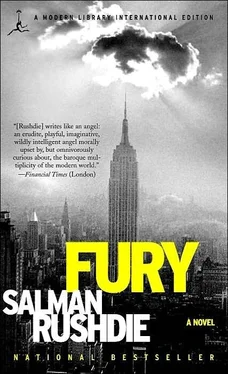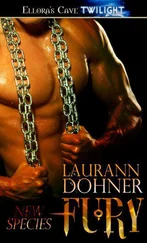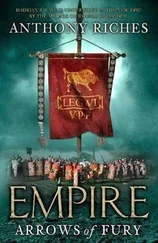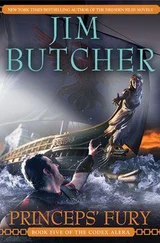Salman Rushdie - Fury
Здесь есть возможность читать онлайн «Salman Rushdie - Fury» весь текст электронной книги совершенно бесплатно (целиком полную версию без сокращений). В некоторых случаях можно слушать аудио, скачать через торрент в формате fb2 и присутствует краткое содержание. Город: New York, Год выпуска: 2002, ISBN: 2002, Издательство: Random House Publishing Group, Жанр: Современная проза, на английском языке. Описание произведения, (предисловие) а так же отзывы посетителей доступны на портале библиотеки ЛибКат.
- Название:Fury
- Автор:
- Издательство:Random House Publishing Group
- Жанр:
- Год:2002
- Город:New York
- ISBN:0679783504
- Рейтинг книги:5 / 5. Голосов: 1
-
Избранное:Добавить в избранное
- Отзывы:
-
Ваша оценка:
- 100
- 1
- 2
- 3
- 4
- 5
Fury: краткое содержание, описание и аннотация
Предлагаем к чтению аннотацию, описание, краткое содержание или предисловие (зависит от того, что написал сам автор книги «Fury»). Если вы не нашли необходимую информацию о книге — напишите в комментариях, мы постараемся отыскать её.
Fury — читать онлайн бесплатно полную книгу (весь текст) целиком
Ниже представлен текст книги, разбитый по страницам. Система сохранения места последней прочитанной страницы, позволяет с удобством читать онлайн бесплатно книгу «Fury», без необходимости каждый раз заново искать на чём Вы остановились. Поставьте закладку, и сможете в любой момент перейти на страницу, на которой закончили чтение.
Интервал:
Закладка:
12
Akasz Kronos, the great, cynical cyberneticist of the Rijk, created the Puppet Kings in response to the terminal crisis of the Rijk civilization, but on account of the flaw in his character that made him unable to consider the general good, he used them to guarantee nobody’s survival or fortune but his own. In those days the polar ice-caps of Galileo—I, the Rijk’s home planet, were in the last stages of melting (a large stretch of open sea had been sighted at the North Pole) and no matter how high the dikes were built, the moment was not far off when the glory of the Rijk, that highest of cultures set in the lowest of lands. which was just then enjoying the richest and most prolonged golden age in its history, would be washed away.
The Rijk fell into decline. Their artists put down their brushes for good, for how could art—which relied like good wine, on the judgment of posterity—be created once posterity had been canceled? Science failed the challenge as well. The Galileo solar system lay in a “dark quadrant near the rim of our own galaxy, a mysterious area in which few other suns burned, and in spite of their high level of technological achievement, the Rijk had never succeeded in locating an alternative home planet. A cross-section of Rijk society was dispatched, cryogenically frozen, in the Max H, a computer-controlled spacecraft programmed to wake its precious cargo if a suitable planet came within range of its sensors. When this spacecraft malfunctioned and exploded a few thousand miles into space, people lost heart. In that most open, broad-minded, and reasonable of societies there now arose a number of fire-and-brimstone preachers, who blamed the coming catastrophe on the godlessness of Rijk culture. Many citizens fell under the spell of these new, narrow men. Meanwhile the sea continued to rise. When a dike sprang a leak, the water pushed through with such violence that whole counties were sometimes flooded before repairs were complete. The economy collapsed. Lawlessness increased. People stayed home and waited for the end.
The sole surviving portrait of Akasz Kronos shows a man with a full head of long silver hair framing a soft, round. surprisingly boyish face dominated by a wine-dark Cupid’s bow of a mouth. He wears a floor-length gray tunic. with gold embroidery at the cuffs and neckline, over a frilled white high-collared shirt: the very picture of the dignified genius. But the eyes are mad. As we peer into the darkness around him, we make out fine white filaments floating from his fingertips. Only after much study do we notice the small bronze-colored figure of a puppet man at the bottom left of the picture, and even then it takes a while before we realize that the puppet has broken free of the puppeteer’s control. The homunculus turns its back on its maker and sets off to forge its own destiny, while Kronos, the abandoned creator, takes leave not only of his creation but of his senses, too.
Professor Kronos was not only a great scientist but an entrepreneur of Machiavellian daring and skill. As the Rijk lands drowned, he quietly moved his center of operations to the two small mountain-islands that formed the primitive but independent nation of Baburia, at the Galilean antipodes. Here he negotiated and signed an advantageous treaty with the local ruler, the Moyol. The Baburians would retain ownership of their territory, but Kronos would be granted long leases over the high mountain pastures, for which he agreed to pay what seemed to the Mogol a very high rent indeed: an annual pair of wooden shoes for every Baburian man. woman, and child. In addition. Kronos undertook to guarantee the defense of Baburia against the assault that must certainly come as the Rijk’s lands sank below the rising waves. For this he was accorded the title of National savior and granted droit de seigneur over all the islands’ new brides. Having come to terms. Kronos proceeded with the creation of the masterpieces that would prove his undoing, the so-called Monstrous Dynasty of Puppet Caesars , also known as Professor Kronos’s No-Strings Puppet Kings.
His own lover, Zameen, the legendary beauty of the Rijk and the only scientist whom Kronos regarded as his peer, refused to accompany him to his new antipodean world. Her place was with her people, she said, and she would die with them if that was what destiny decreed. Akasz Kronos abandoned her without a second thought, perhaps preferring the sexual multiplicity available on the other side of the world.
The broken strings in the Kronos portrait are purely metaphorical. The Professor’s artificial life-forms were string-free from the start. They walked and talked: they had stomachs.” sophisticated fueling centers that could process ordinary food and drink, with solar-cell backupsystems that enabled them to stay alert, and work, for longer hours than any flesh-and-blood human being. They were faster, stronger, smarter—“better,” Kronos told them—than their human, antpodean hosts. “You are kings and queens,” he taught his creatures. “Carry yourselves well. You are the masters now.” He even gave them the power to reproduce themselves. Each cyborg was given his or her own blueprint so that it could, in theory, endlessly re-create itself in its own image. But in the master program Kronos added a Prime Directive: whatever order he gave, the cyborgs and their replicas were obliged to obey, even to the point of acquiescing in their own destruction. should he deem that necessary. He dressed them in finery and gave them the illusion of freedom, but they were his slaves. He gave them no names. There were seven-digit numbers branded on their wrists, and they were known by these.
No two Kronosian creations were the same. Each was given its own sharply delineated personality traits: the Aristocratic Philosopher :the Promiscuous Child-Woman :the First Rich Ex—Wife (a Bitch):the Aging Groupie : the Pope’s Driver :the Underwater Plumber : the Traumatized Quar terback : the Blackballed Golfer : the Three Society Girls: the Playboys : the Golden Child and His Ideal Mother :the Deceitful Publisher : the Angry Profes sor : the Goddess of Victory (an exceptionally beautiful cyborg modeled after Kronos’s abandoned lover. Zameen of Rijk): the Runners :the Cell-Phone Woman : the Cell-Phone Man :the Human Spiders : the Woman Who Saw Visions : the Astro-Adman; even a Dollmaker . And as well as characters, strengths, weaknesses, habits, memories, allergies, lusts—he gave them a value system by which to live. The greatness of Akasz Kronos, which was also his downfall, may be judged by this: that the virtues and vices he inculcated in his creations were not wholly, or not only, his own. Self-serving, opportunistic, unscrupulous, he nevertheless permitted his cybernetic life-forms a degree of ethical independence. The possibility of idealism was allowed.
Lightness, quickness, exactitude, visibility, multiplicity, consistency : these were the six high Kronosian values, but instead of embedding single definitions of these principles in the cyborgs’ default programs, he offered his creations a series of multiple-choice options. Thus lightness might be defined as “doing lightly what is in reality a heavy duty,” that is to say, grace: but it might also be “treating frivolously what is serious,” or even “making light of what is grave. that is, amorality. And quickness could be “doing swiftly whatever is necessary,” in other words, efficiency: however, if the emphasis were to be placed on the second part of that phrase, a kind of ruthlessness could result. Exactitude could tend toward “precision or “tyranny.” “visibility” might be “clarity of action” or “attention-seeking.” Multiplicity was capable of being both open-mindedness” and “duplicity.” and “consistency, “the most important of the six, could mean either “trustworthiness” or “obsessiveness”—the consistency of—we may use our own world’s models here, for the sake of easy comparison—Bardeby the Scrivener, who preferred not to, or of Michael Kohlhaas, with his inexorable and world-shattering search for redress. Sancho Panza is consistent in the reliable sense of the word, but so, contrariwise, is erratic, fixated, chivalry-maddened Quixote. And note, too, the tragic consistency of the Land Surveyor, eternally yearning toward what he can never attain, or of Ahab in his pursuit of the whale. This is the consistency that destroys the consistent; for the Ahabs perish. while the inconsistent, the Ishmaels, survive. “The fullness of a living self is inexpressible, obscure,” Kronos told his mechanical fictions. “In that mystery is freedom, which is what I have given you. In that obscurity is light.”
Читать дальшеИнтервал:
Закладка:
Похожие книги на «Fury»
Представляем Вашему вниманию похожие книги на «Fury» списком для выбора. Мы отобрали схожую по названию и смыслу литературу в надежде предоставить читателям больше вариантов отыскать новые, интересные, ещё непрочитанные произведения.
Обсуждение, отзывы о книге «Fury» и просто собственные мнения читателей. Оставьте ваши комментарии, напишите, что Вы думаете о произведении, его смысле или главных героях. Укажите что конкретно понравилось, а что нет, и почему Вы так считаете.











